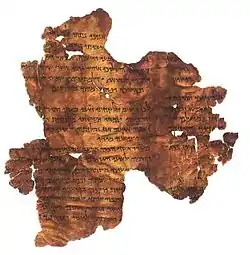Hosea 4
Hosea 4 is the fourth chapter of the Book of Hosea in the Hebrew Bible or the Old Testament of the Christian Bible.[1][2] This book contains the prophecies attributed to the prophet Hosea son of Beeri. In this chapter he reproves the people and priests for their sins in the interregnum following Jeroboam's death; hence there is no mention of the king or his family; and in Hosea 4:2 bloodshed and other evils usual in a civil war are specified.[3] It is a part of the Book of the Twelve Minor Prophets.[4][5]
| Hosea 4 | |
|---|---|
← Hosea 3 Hosea 5 → | |
 4Q166 "The Hosea Commentary Scroll", late first century B.C. | |
| Book | Book of Hosea |
| Category | Early Prophets |
| Christian Bible part | Old Testament |
| Order in the Christian part | 28 |
Text
The original text was written in Hebrew language. This chapter is divided into 5 verses.
Textual witnesses
Some early manuscripts containing the text of this chapter in Hebrew are of the Masoretic Text tradition, which includes the Codex Cairensis (895), the Petersburg Codex of the Prophets (916), Aleppo Codex (10th century), Codex Leningradensis (1008).[6] Fragments containing parts of this chapter in Hebrew were found among the Dead Sea Scrolls including 4Q78 (4QXIIc; 75–50 BCE) with extant verses 1–19;[7][8][9][10] and 4Q82 (4QXIIg; 25 BCE) with extant verses 1, 9–11, 13–14.[8][11][12][13]
There is also a translation into Koine Greek known as the Septuagint, made in the last few centuries BCE. Extant ancient manuscripts of the Septuagint version include Codex Vaticanus (B; B; 4th century), Codex Alexandrinus (A; A; 5th century) and Codex Marchalianus (Q; Q; 6th century).[14][lower-alpha 1]
Verse 6
- My people are destroyed for lack of knowledge:
- because thou hast rejected knowledge,
- I will also reject thee,
- that thou shalt be no priest to me:
- seeing thou hast forgotten the law of thy God,
- I will also forget thy children.[16]
- "My people are destroyed for lack of knowledge": Here the verb is plural and its subject singular, because, being collective, it comprehends all the individual members of the nation. The word כדמו is rendered (1) by Jerome in the sense of "silence:" "conticuit populus incus," which he explains to mean "sinking into eternal silence," as also the Chaldee version. (2) The LXX understands it in the sense of "likeness:" "My people are like (ὡμοιώθη) as if they had no knowledge."[17] So Isaiah mourns in the same words, "therefore my people are gone into captivity, because they have no knowledge" Isaiah 5:13.[18]
- "Lack of knowledge": "of God" (Hosea 4:1), that is, lack of piety. Their ignorance was wilful, as the epithet, "My people," implies; they ought to have known, having the opportunity, as the people of God.[3]
- "Thou hast rejected knowledge": The priests that Jeroboam made were of the lowest of the people, ignorant and illiterate men (1 Kings 12:31) and they chose to continue such, rejecting with contempt and abhorrence the knowledge of God, and of all divine things.[19]
Notes
- Book of Hosea is missing from the extant Codex Sinaiticus.[15]
References
- Halley, Henry H. Halley's Bible Handbook: an abbreviated Bible commentary. 23rd edition. Zondervan Publishing House. 1963.
- Holman Illustrated Bible Handbook. Holman Bible Publishers, Nashville, Tennessee. 2012.
- Robert Jamieson, Andrew Robert Fausset; David Brown. Jamieson, Fausset, and Brown's Commentary On the Whole Bible. 1871.
 This article incorporates text from this source, which is in the public domain.
This article incorporates text from this source, which is in the public domain. - Metzger, Bruce M., et al. The Oxford Companion to the Bible. New York: Oxford University Press, 1993.
- Keck, Leander E. 1996. The New Interpreter's Bible: Volume: VII. Nashville: Abingdon.
- Würthwein 1995, pp. 35-37.
- Ulrich 2010, pp. 592–593.
- Dead sea scrolls - Hosea
- Fitzmyer 2008, p. 38.
- 4Q78 at the Leon Levy Dead Sea Scrolls Digital Library
- Fitzmyer 2008, p. 39.
- Ulrich 2010, pp. 591–593.
- 4Q82 at the Leon Levy Dead Sea Scrolls Digital Library
- Würthwein 1995, pp. 73-74.
- Shepherd, Michael (2018). A Commentary on the Book of the Twelve: The Minor Prophets. Kregel Exegetical Library. Kregel Academic. p. 13. ISBN 978-0825444593.
- Hosea 4:6 KJV
- Joseph S. Exell; Henry Donald Maurice Spence-Jones (Editors). The Pulpit Commentary. 23 volumes. First publication: 1890.
 This article incorporates text from this source, which is in the public domain.
This article incorporates text from this source, which is in the public domain. - Barnes, Albert. Notes on the Old Testament. London, Blackie & Son, 1884. Reprint, Grand Rapids: Baker Books, 1998.
 This article incorporates text from this source, which is in the public domain.
This article incorporates text from this source, which is in the public domain. - John Gill. John Gill's Exposition of the Entire Bible. Exposition of the Old and New Testament. Published in 1746-1763.
 This article incorporates text from this source, which is in the public domain.
This article incorporates text from this source, which is in the public domain.
Sources
- Collins, John J. (2014). Introduction to the Hebrew Scriptures. Fortress Press. ISBN 9781451469233.CS1 maint: ref=harv (link)
- Day, John (2007). "27. Hosea". In Barton, John; Muddiman, John (eds.). The Oxford Bible Commentary (first (paperback) ed.). Oxford University Press. pp. 571–578. ISBN 978-0199277186. Retrieved February 6, 2019.
- Fitzmyer, Joseph A. (2008). A Guide to the Dead Sea Scrolls and Related Literature. Grand Rapids, MI: William B. Eerdmans Publishing Company. ISBN 9780802862419.CS1 maint: ref=harv (link)
- Hayes, Christine (2015). Introduction to the Bible. Yale University Press. ISBN 978-0300188271.CS1 maint: ref=harv (link)
- Ulrich, Eugene, ed. (2010). The Biblical Qumran Scrolls: Transcriptions and Textual Variants. Brill.CS1 maint: ref=harv (link)
- Würthwein, Ernst (1995). The Text of the Old Testament. Translated by Rhodes, Erroll F. Grand Rapids, MI: Wm. B. Eerdmans. ISBN 0-8028-0788-7. Retrieved January 26, 2019.